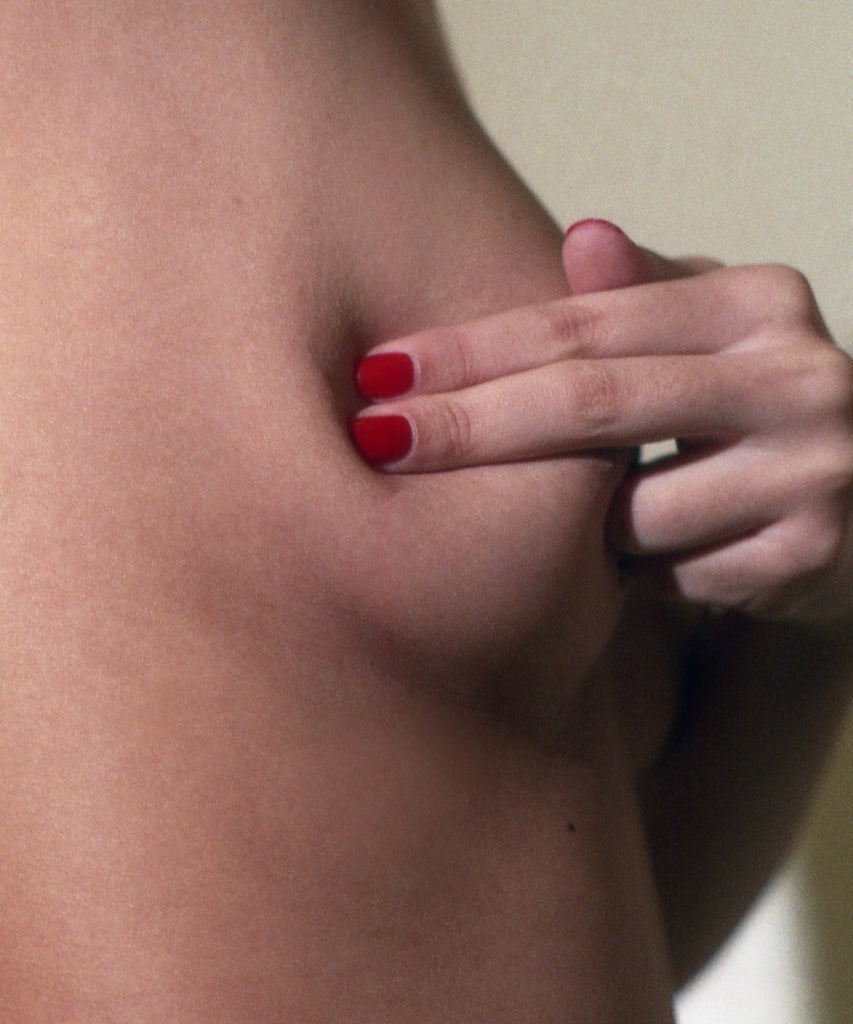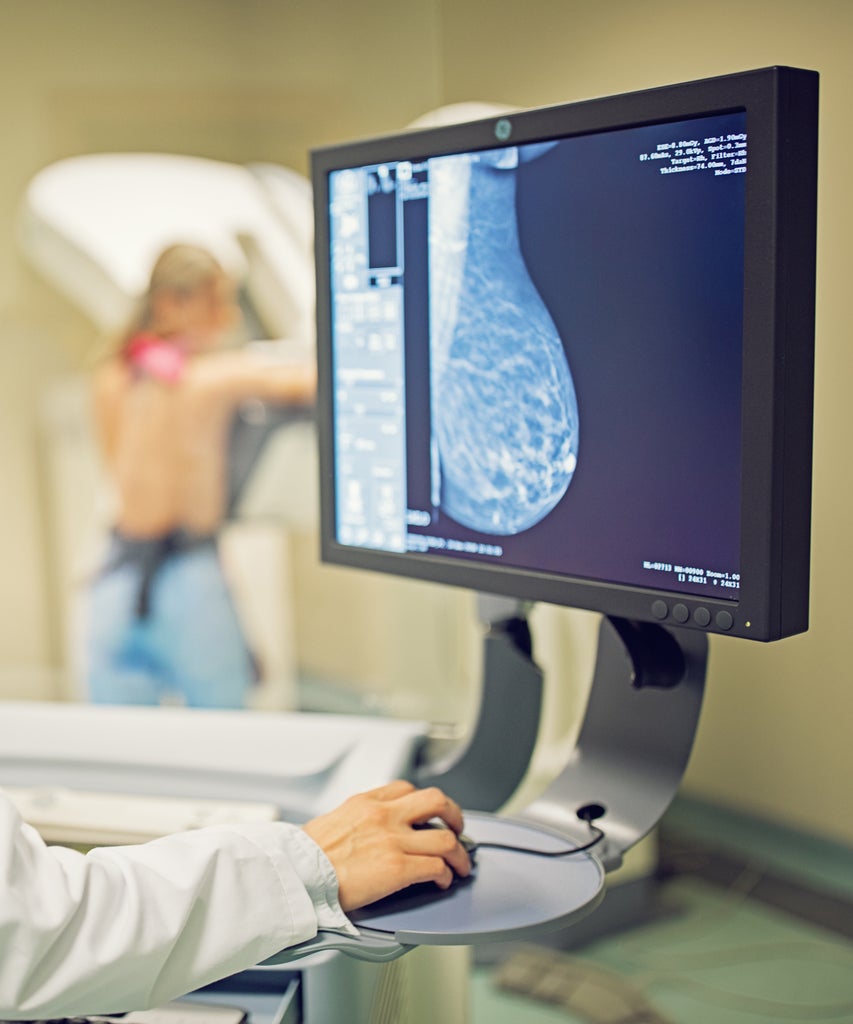Many Women Find Their Own Breast Cancer. Here’s How To Check Yourself
October 31, 2020BruceDayne#DMTBeautySpot #beauty

Three years ago, Allie Brudner was taking a shower when she noticed a lump in her left breast. “I brushed it off,” she remembers. “It was a crazy time in my life. I was getting married in just a few weeks.” She’d just gone to her OB/GYN for a well woman exam a few weeks prior, and had gotten a clean bill of health. She was only 28. She put it out of her mind, and focused on her wedding.
But a few weeks after the ceremony, she noticed the lump sometimes felt tender, and seemed a bit bigger. She showed a friend who was in the medical field and a few family members. “I asked them, ‘This is nothing, right?’” Brudner remembers. But they all got the same worried look on their faces, and advised her to get it checked again. So she pushed her OB/GYN to do more testing. She ended up having stage two, triple negative breast cancer.
Brudner, who went on to co-found The Breasties, a breast and reproductive cancer nonprofit, is now in remission. Stories like hers underscore the importance of being familiar with your own breast tissue. Approximately 40 percent of diagnosed breast cancers are found by people who felt a lump, Johns Hopkins Medicine reports. And when you know what your chest feels like, you’re more likely to notice changes that could indicate an issue like cancer.
The recommendations about when and how to check your chest, however, have changed in recent years. We asked doctors for the most updated information.
Are breast self-exams still recommended?
The answer is complicated. Some doctors and organizations — including The American College Of Obstetrics And Gynecology and American Cancer Society — have shifted away from pushing everyone to do monthly self-exams. Now the goal is generally to promote “breast self-awareness,” explains Sandhya Pruthi, MD, a breast health specialist and a consultant at Mayo Clinic’s breast diagnostic clinic.
The difference between a self-exam and self-awareness is that the latter is more informal. Dr. Pruthi, for instance, encourages people to feel their breasts and chests regularly, while they get dressed or shower, rather than trying to adhere to a strict schedule.
Methodical self-exams pose “a risk of harm from false-positive test results and a lack of evidence of benefit,” ACOG noted of self-exams in a 2017 bulletin, Breast Cancer Risk Assessment and Screening in Average-Risk Women. And one study found that people who perform self-exams may be more likely to undergo biopsies (which can be anxiety-provoking and expensive), but not any less likely to die from breast cancer.
But not all doctors agree with the move away from self-exams. “I do think breast self-exams are still a good idea — and I know that there’s controversy about it,” says Eileen Y. Krim, MD, gynecologist at New York University Langone Great Neck Medical. “I don’t understand the logic of saying no to self-exams. Yes, people will feel things, and it may be nothing. But I’d rather see someone three times in one year for something unimportant than miss something.”
Self-exam advocates say checking your breasts may be even more important during the COVID-19 pandemic. Especially since many people canceled or postponed their annual preventive exams during quarantine, notes Bri Majsiak, a co-founder at The Breasties.
There’s no reason to stop performing formal self-exams if you like them and they put you at ease — especially if your doctor told you to do them. The screening guidelines change for people with an elevated risk of breast cancer, due to factors such as a strong family history or a genetic predisposition, so make sure to visit your doctor to talk about your risk level to develop the best screening plan for you.
How to check your breasts
Whether you do a monthly exam or not, you should be touching your chest fairly often. If you’re opting for breast awareness, Dr. Pruthi recommends this technique: “When you’re in the shower or sitting or standing in front of a mirror, raise your arm above your head. Using the opposite hand, you can move your fingers in a sweeping motion from the outside to the inner breast, following the hands of a clock and making your way around the clock so that the entire breast is examined.” It’s natural and fast, but will still give you a sense of what your chest feels like.
If you opt to do an official self-exam, The National Breast Cancer Foundation recommends using the pads of your three middle fingers to feel the entire breast, applying light, medium, and firm pressure. They recommend feeling each breast twice, once while standing and once while lying down. Then do a visual check in the mirror to take note of skin, shape, and size changes. (They have a more thorough tutorial on their site.) Since hormone changes during your period can make the breasts feel lumpier, Dr. Krim says monthly self-exams should be performed during the week after menstruation (or, if you don’t have periods, on the first of the month).
In both cases, check the folds under your breasts, your armpits, and up to your collarbone. “These are tricky areas you’re more likely to miss,” says Anna Maria Storniolo, MD, the Andrew and Peggy Thomson professor of hematology and oncology at the Indiana University School of Medicine. And keep an eye out for changes in skin texture, like a thickening in certain spots; a new sense of “fullness”; a change in color; nipple discharge — or really, any changes at all.

I think I see something off. What should I do?
Call your OB/GYN or primary care doctor ASAP — or, if you don’t have those, an urgent care doctor or even Planned Parenthood — and tell them that you’re concerned about a breast lump or change, says Dr. Krim. If they try to brush you off, it’s fine to push back and insist on an exam, Brudner notes. “Meeting people in [the breast cancer] community has taught me the importance of advocating for yourself and asking questions,” she says.
Bring as much information as you have to your appointment, including when you first noticed the issue and if it’s changed since then (like if a lump has gotten larger). They’ll do a clinical exam and, potentially, a mammogram, ultrasound, or both. About 80% of breast lumps biopsied are benign, according to the Stony Brook Cancer Center. But if it is something, your doctor will likely refer you to a specialist or oncologist to help you through the next steps.
What other screenings do I need?
It all depends on your age, your risk factors, and which guidelines your OB/GYN is partial to, so talk to your doctor. Your OB/GYN may perform a clinical breast exam (which is when your doctor uses their fingers to examine the chest) at your checkups, but not always. Most women begin getting annual mammograms around age 40 — but again, how “at risk” you are matters, so check in with your doctor about the best plan for you, Dr. Pruthi says. Also of note: People with dense breasts, which make mammograms harder to read, may also get additional screenings other than a mammogram, such as a breast ultrasound, Dr. Storniolo explains.
Screenings should be covered by insurance. If you’re uninsured, Planned Parenthood will often work with patients who can’t afford a visit — many folks will qualify for free or low-cost exams.
The chance that a woman will die from breast cancer is just 2.6%, according to The American Cancer Society. Part of the reason that number is so low is because increased awareness and more screenings. Many people are detecting cancers earlier, which is a good thing. So, it’s very much worth getting up close and personal with your chest. As Brudner puts it: “Really getting to know your body and what your normal is, is just so important.”
Like what you see? How about some more R29 goodness, right here?
What Breast Cancer Awareness Month Gets Wrong
Beyoncé's Dad Reveals Breast Cancer Diagnosis
More Breast Cancers Have Been Diagnosed Under ACA
DMTBeautySpot
via https://www.DMTBeautySpot.com
Molly Longman, Khareem Sudlow


0 comments